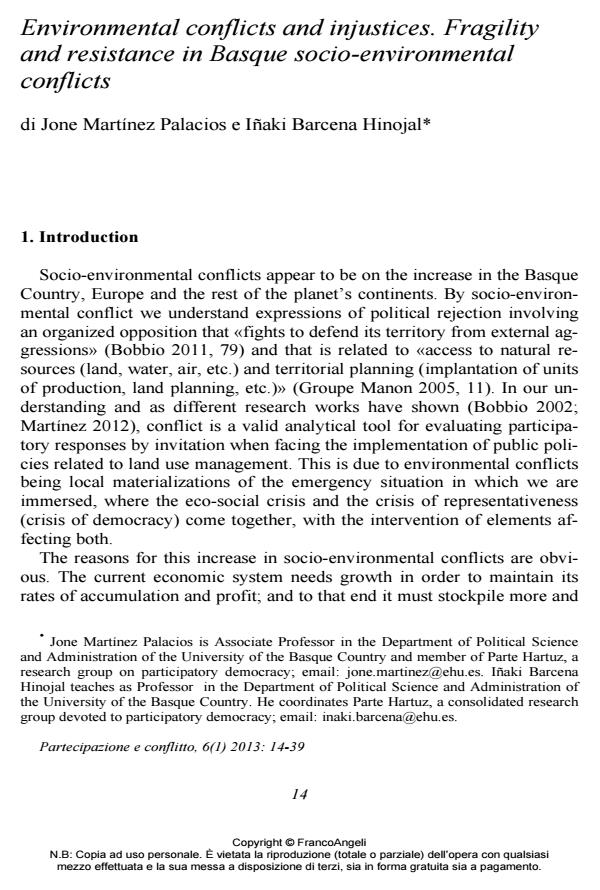Environmental conflicts and injustices. Fragility and resistance in Basque socio-environmental conflicts
Journal title PARTECIPAZIONE E CONFLITTO
Author/s Palacios Jone Martínez, Hinojal Inaki Barcena
Publishing Year 2013 Issue 2013/1
Language Italian Pages 26 P. 14-39 File size 233 KB
DOI 10.3280/PACO2013-001002
DOI is like a bar code for intellectual property: to have more infomation
click here
Below, you can see the article first page
If you want to buy this article in PDF format, you can do it, following the instructions to buy download credits

FrancoAngeli is member of Publishers International Linking Association, Inc (PILA), a not-for-profit association which run the CrossRef service enabling links to and from online scholarly content.
Following several years of studying and analyzing ecological conflicts in the Basque Country the present article aims to analyze the main reasons that explain why such high levels of socio-environmental conflict are found there. We know that more protests occur in the Basque Country in proportion to its population than in other neighboring regions or even in other European countries. We ask whether such high levels of conflict are rooted in the dynamics of the Basque national pro-test or, on the contrary, are linked to other questions of territorial or social fragility. In this article we propose a model for determining the reasons why in the face of infrastructural projects with comparable characteristics (road and rail projects, in-cinerators, dumps, ports, combined cycle power plants, high-voltage power lines, wind farms or fracking projects) conflicts arise in some cities and areas but not in others. We apply the model to five Basque socio-environmental conflicts in order to analyze the keys to the successful outcome of protests, and to determine whether or not each place has its own "ecosystem of conflict" that particular characteristics of which cannot be exported elsewhere.
Keywords: Environmental conflicts, conflictual ecosystem, environmental injus-tice, Basque Country
- Shifting Grounds of Collaboration in Changing Contexts: Evolving Environmental Networks in the Basque Country Alejandro Ciordia, Luigi Schiavo, Mario Diani, in Politics and Governance 9932/2025
DOI: 10.17645/pag.9932
Palacios Jone Martínez, Hinojal Inaki Barcena, Environmental conflicts and injustices. Fragility and resistance in Basque socio-environmental conflicts in "PARTECIPAZIONE E CONFLITTO" 1/2013, pp 14-39, DOI: 10.3280/PACO2013-001002